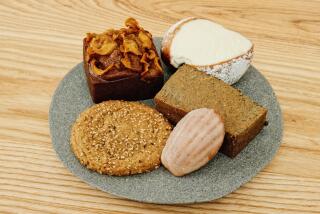Sublimely Korean (and Hot, Too)
- Share via
“This is one of the finest things I ever put in my mouth,” raved a friend I took to Jeon Ju. Of course, he’s a Korean food fanatic, ravenous for anything with garlic and the Korean pickled vegetables called kimchi. What we were eating--fried pork with kimchi--was awfully good by any standard. It was a gorgeous platter of sliced pork (a fatty cut that looks like uncured bacon) mixed with kimchi, onion slivers and sliced zucchini in a sweet red-orange sauce hot with chiles.
It’s not even Jeon Ju’s specialty. The strong suit here is rice dishes (dor sot), which come in black stone pots so hot the rice at the bottom and on the sides becomes crusty. In fact, they’re so hot that after spooning out the contents, the waitress may pour in water, which will bubble furiously, making a sort of bland soup you’re supposed to try after the other dishes.
Young-yang dor sot, a health-food lover’s dream, combines rice with barley, green peas, various beans, carrots, corn kernels, shiitake mushrooms and jujubes (red dates), all topped off with shredded ginseng. You mix the contents and divide it into individual bowls. If you resist adding soy sauce, you will experience the subtle, natural flavors of the grains, beans and vegetables. Jeon Ju dor sot, the house stone pot rice, is similar but has fewer ingredients.
One of Jeon Ju’s special dishes is kalbi (beef ribs) over steamed rice. This isn’t barbecued ribs on a mound of plain rice--it’s a potful of rice mixed with bits of meat, sweet potato shreds, crisp seaweed strands, bean sprouts, kimchi, spinach and a fried egg.
Bibim bap is a standard dish in Korean restaurants, but if I were to order just one dish here, this would be it. It’s soybean sprouts, red lettuce, kimchi, dried seaweed and a fried egg, to which you add warm rice and hot sweet-bean paste. You stir it up with a big spoon, making a marvelous blend of flavors, textures and colors. The rice is sticky, the fresh soybeans attached to the sprouts are crunchy, the kimchi is tangy, and the bean paste is spicy and sweet.
You also stir a bowl of rice into tuk man doo, a soup made with flat, thin rice cakes, meat-stuffed dumplings, seaweed slivers and a few pieces of beef. When you add the rice, it soaks up the broth, and you wind up with a very hearty, starchy dish.
There are soups that don’t involve rice. Noodles in cold soybean soup is exactly what it says--fine noodles stirred into a thin bean puree chilled with ice cubes. Kimchi soup is a wonderful broth containing nappa cabbage kimchi, a few slices of chewy beef and lots of tofu.
One of the pleasures of eating at a Korean restaurant is checking out the side dishes that come with the meal. Because it’s summer, you start with chilled corn-barley tea. Then the waitress brings several varieties of kimchi and other nibbles that change from day to day.
Once, we got strips of a chewy root seasoned with sugar and the brightest imaginable ground red pepper. That was outstanding, but I also liked deep-fried tofu slices with soy sauce, sesame oil, sesame seeds, green onions and red chiles. The sauce did wonders for the bland tofu.
Red lettuce is usually sprinkled with a sweet dressing, and one day I was surprised by cabbage kimchi that was very sweet as well as peppery. Seaweed soup may appear, as well as a bowl of raw green chiles and long beans for dipping in a highly seasoned bean paste. And there is often a cut-up golden pancake that contains green onions (the waitress jokingly calls it “Korean pizza”).
Most main dishes are also accompanied by rice mixed with green peas. This is not served in a bowl as in most Korean restaurants, but in a hot black stone pot.
Jeon Ju is a small, neat place in a corner mall on Olympic Boulevard, a block west of Vermont Avenue. It’s sparely but nicely decorated with panels of Korean writings, a few straw farm implements and one wall that resembles a rice paper screen. A mirror at the back makes it seem larger.
The menu cards on each table list slightly more than 20 dishes, including broiled fish, which goes well with the spicier foods, and such intriguing things as raw crab with rice, a crab casserole and a spicy eel casserole. Oh, yes--the ubiquitous Korean barbecued beef dish, bulkogi, is available if you insist. But it will be cooked in the kitchen, not at the table.
BE THERE
Jeon Ju, 2716 W. Olympic Blvd., Los Angeles, (213) 386-5678. Open daily, 10 a.m. to 10 p.m. Takes major credit cards. No alcohol. Park in the mall lot or on the street. Dinner for two, food only, $14 to $26.
What to get: Kalbi over steamed rice, grains over steamed rice, bibim bap, fried pork with kimchi, kimchi soup.
More to Read
Eat your way across L.A.
Get our weekly Tasting Notes newsletter for reviews, news and more.
You may occasionally receive promotional content from the Los Angeles Times.










